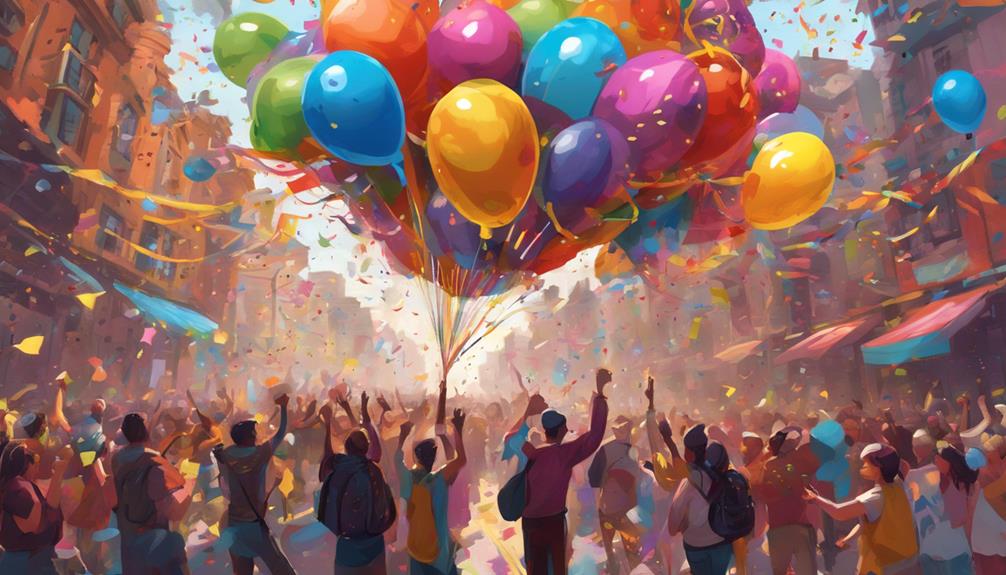As you explore the concept of a festival, you'll find that it's a celebration that embodies the essence of culture, identity, and communal bonding. At its core, a festival is a collective event that brings people together to commemorate significant occasions, honor traditions, and showcase heritage. With roots in ancient cultures, festivals have evolved over time, reflecting changing societal values and cultural norms. From music and food festivals to religious and seasonal celebrations, the diversity of festivals is vast. As you continue to uncover the meaning of festival, you'll discover the intricacies of this dynamic convergence of people, culture, and celebration.
Key Takeaways
- A festival is a celebration that honors significant events, traditions, or cultural heritage, often featuring music, dance, and art.
- The term 'festival' originates from the Latin word 'festivus,' meaning 'pertaining to a feast,' and is rooted in ancient cultures.
- Festivals serve as platforms for celebrating heritage, reinforcing values, and fostering social cohesion within communities.
- Key elements of a festival include a clear theme, engaging activities, opportunities for participation, and curated experiences that create lasting impressions.
Origins of the Word Festival
The word 'festival' has its roots in ancient Latin, deriving from 'festivus,' an adjective meaning 'pertaining to a feast,' which you'll likely recognize as the source of the English word 'festive.'
As you explore the etymological roots of 'festival,' you'll notice a fascinating linguistic evolution. The Latin 'festivus' is itself derived from 'festus,' meaning 'feast day' or 'holiday.'
Over time, the term 'festival' has evolved to encompass a broader range of celebrations and events. By examining the word's origins, you gain insight into the cultural and historical contexts that have shaped its meaning.
This nuanced understanding of 'festival' allows you to appreciate the complexities of language and the ways in which words can adapt and change over time.
Historical Development of Festivals
As you explore the historical development of festivals, you'll notice that they've their roots in ancient cultures, where rituals and ceremonies were used to mark important events and honor deities.
Over time, these rituals evolved and took on new meanings, reflecting the changing values and beliefs of the societies that practiced them.
Ancient Origins of Festivals
Many ancient cultures, you'll find, have been celebrating festivals for thousands of years, with evidence of ritual gatherings and ceremonies dating back to prehistoric times.
As you explore the ancient origins of festivals, you'll notice that they often revolved around ancient rituals and seasonal celebrations. These events were deeply rooted in the cultures' spiritual and agricultural practices.
For instance, ancient harvest festivals were held to mark the changing of the seasons and the cycle of life and death. Similarly, ancient rituals were performed to guarantee fertility, prosperity, and protection from natural disasters.
Evolution of Rituals
Festivals have undergone significant transformations over time, with rituals evolving to reflect changing societal values, cultural exchange, and technological advancements that have reshaped the way you experience and participate in these events.
As you look at the history of festivals, you'll notice that ritual transformations have been a key aspect of their evolution. For instance, many seasonal celebrations have origins in ancient agricultural practices, but have since been adapted to incorporate new customs and traditions.
You might find that festivals have also borrowed elements from other cultures, resulting in unique blends of rituals and practices. These changes have allowed festivals to remain relevant and meaningful, even as the world around them has changed dramatically.
Cultural Significance Emerges
Within the fabric of human culture, you'll find that festivals have woven themselves into the very essence of societies, emerging as pivotal events that reflect and shape the values, traditions, and identities of communities throughout history.
As you explore the cultural significance of festivals, you'll notice that they play a vital role in defining cultural identity. Festivals serve as a platform for communities to come together, celebrate their heritage, and reinforce their shared values.
This communal bonding fosters a sense of belonging and social cohesion, allowing individuals to connect with their cultural roots. By examining the historical development of festivals, you'll gain insight into the complex dynamics of cultural identity and the ways in which festivals have evolved to reflect the changing needs and values of societies.
Cultural Significance of Festivals
As you explore the cultural significance of festivals, you'll find that they're often woven into the fabric of a community's identity, providing a shared experience that transcends generations and geographical boundaries.
Festivals play an essential role in shaping a community's cultural identity, reflecting its values, traditions, and history.
Communal values are also reinforced through festivals, as they bring people together, fostering social cohesion and a sense of belonging.
By participating in festivals, individuals can connect with their heritage and cultural roots, strengthening their sense of identity and community ties.
This shared cultural experience can also promote cross-cultural understanding and exchange.
Types of Festivals Around World
You'll encounter a diverse array of festivals across the globe, each with its unique flavor, reflecting the distinct cultural, social, and historical contexts in which they're celebrated. As you explore the world of festivals, you'll come across various types that cater to different interests and preferences.
| Festival Type | Description |
|---|---|
| Music Festivals | Featuring live performances by local and international artists |
| Food Festivals | Showcasing traditional cuisine and local delicacies |
| Religious Festivals | Celebrating spiritual and cultural heritage |
| Art Festivals | Exhibiting works by local and international artists |
| Seasonal Festivals | Marking changes in seasons or harvest cycles |
From cultural festivals to historical festivals, traditional festivals to international festivals, each type offers a unique experience. Whether you're interested in music, food, art, or spirituality, there's a festival out there that's sure to captivate you.
Key Elements of a Festival
Beyond the diverse array of festivals that cater to different interests and preferences, what makes a festival truly memorable and impactful are its key elements, which work together to create a unique and engaging experience for attendees.
You'll notice that festival themes play an essential role in setting the tone and atmosphere of the event. These themes can range from cultural and historical to musical and artistic.
Festival activities are also a significant component, offering attendees a chance to participate, engage, and interact with others. These activities can include performances, workshops, exhibitions, and competitions.
When carefully curated, festival themes and activities come together to create a rich and immersive experience that leaves a lasting impression on attendees.
Festival as a Social Event
When considering the festival as a social event, you start to uncover its intricate roles and impacts within society. One important perspective on festivals revolves around analyzing both 'community-building' characteristics alongside “Cultural celebration displays.”
First, more consideration becomes necessary if we are to understand the significance of joining together in these celebrations. Festivals serve as common ground where individuals can come together, fostering a sense of belonging and unity within the community.
Cultural elements are crucial in these gatherings. They allow participants to express their identities and share their traditions, creating a rich tapestry of experiences that resonate with both personal and collective significance. This cultural celebration acts as a platform for individuals to showcase their heritage and connect with others who share similar backgrounds.
However, the impact of festivals goes beyond mere celebration. They often initialize work, bringing people together to collaborate on various projects, whether they be artistic, communal, or social. The festival becomes a catalyst for change and innovation within the community.
It is crucial to analyze how these events can foster a sense of identity and belonging among participants. Festivals can help individuals navigate the complexities of their cultural identities while simultaneously allowing them to engage with those from different backgrounds.
Moreover, the question arises: why do we gather for these festivals? Understanding the motivations behind participation can deepen our appreciation for these events. They often serve as a space for reflection, connection, and celebration of shared values and experiences.
In considering the festival's role in society, one must recognize how it can facilitate conversations and connections that might not occur in everyday life. The significance of gathering as a community is underscored by the relationships that are built and strengthened during these occasions.
Ultimately, the festival is more than just a series of events; it is an integral part of community life. It reflects the values and aspirations of its participants, serving as a reminder of the importance of collective experiences in shaping our understanding of ourselves and each other.
Community Building Activities
Festivals aren't just a celebration of a particular theme or occasion, but also serve as a catalyst for community building activities that bring people together, foster social connections, and create a sense of belonging.
When you attend a festival, you're not just participating in an event; you're contributing to community engagement and social cohesion.
Here are some ways festivals achieve this:
- Breaking social barriers: Festivals bring together people from diverse backgrounds, encouraging interaction and understanding.
- Promoting collective experiences: Shared experiences, like watching a concert or parade, create common memories and a sense of shared identity.
- Fostering community pride: Festivals often showcase local talent, cuisine, and traditions, instilling pride in the community.
- Encouraging social support: Festivals can provide opportunities for social support, such as fundraising for local causes or supporting local businesses.
Cultural Celebrations
As you engage yourself in a festival, you're likely to find that it's a vibrant celebration of cultural heritage, where traditions, customs, and values are showcased through music, dance, art, and food.
Festivals often highlight local traditions, allowing you to experience the unique character of a community.
You'll notice how festivals serve as a platform for community identity, where people come together to share and express their cultural roots.
By participating in these celebrations, you'll gain insight into the community's history, values, and social norms.
This shared experience fosters a sense of belonging and unity among community members, reinforcing their collective identity.
As you involve yourself in the festivities, you'll begin to appreciate the significance of cultural celebrations in shaping community identity.
Festivals and Their Symbolism
You're likely familiar with the vibrant colors, lively music, and joyful atmosphere that characterize many festivals, but have you ever stopped to contemplate the deeper meaning behind these celebrations?
Festivals often have symbolic meanings that go beyond their festive atmosphere. They can represent cultural heritage, spiritual beliefs, and community values.
Here are some examples of festival themes and their symbolic meanings:
- Renewal and Rebirth: Many festivals, like the Chinese New Year, symbolize the cyclical nature of life and the promise of new beginnings.
- Gratitude and Abundance: Harvest festivals, such as Thanksgiving, express appreciation for the fruits of one's labor and the abundance of nature.
- Spiritual Enlightenment: Festivals like Diwali, the Hindu festival of lights, represent the triumph of light over darkness and good over evil.
- Community and Unity: Cultural festivals, like Carnaval, bring people together, fostering a sense of belonging and social cohesion.
Modern Interpretations of Festivals
While understanding the symbolic meanings behind festivals provides valuable insight into their cultural significance, it's also important to contemplate how these celebrations are reinterpreted and reimagined in modern times.
You may notice that festivals are no longer confined to traditional settings, but have evolved to incorporate new technologies and urban landscapes.
Digital festivals, for instance, have become increasingly popular, allowing people to connect and celebrate with others across the globe.
Urban celebrations, too, have taken on new forms, with city streets and public spaces being transformed into vibrant festival grounds.
As you explore these modern interpretations, consider how they reflect changing societal values and cultural norms.
The Essence of a Festival
At its core, a festival is a dynamic convergence of people, culture, and celebration, embodying the collective spirit of a community through a shared experience that transcends everyday life.
As you engage yourself in a festival, you'll notice the richness of festival traditions that have been passed down through generations. These traditions evoke strong sensory experiences that stimulate your senses and create lasting memories.
Here are some ways festivals evoke emotions:
- Vibrant colors: The spectrum of colors from decorations, costumes, and food creates a visually stunning atmosphere.
- Infectious rhythms: The sounds of music and laughter fill the air, drawing you into the celebration.
- Aromas of traditional cuisine: The smells of local delicacies tantalize your taste buds and evoke a sense of nostalgia.
- Electric atmosphere: The collective energy of the crowd creates an exhilarating experience that's hard to forget.
Conclusion
You've explored the concept of a festival, tracing its origins, historical development, and cultural significance.
You've seen how festivals vary across the world, yet share common elements.
As a social event, a festival brings people together, often symbolizing something deeper.
Modern interpretations continue to evolve, but the essence of a festival remains: a celebration of community, culture, and shared human experience.
It's a time to connect, reflect, and revel in the collective spirit.



